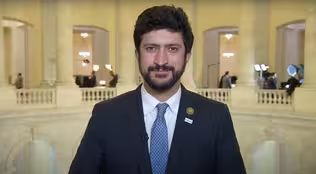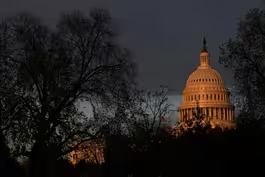
Fed lowers interest rates again but future cuts in question
Clip: 12/18/2024 | 5m 34sVideo has Closed Captions
Fed lowers interest rates again but inflation concerns make future cuts uncertain
The Federal Reserve lowered rates for the third consecutive time but also suggested there won’t be as many interest rate cuts in the year ahead as it once planned. Chairman Jerome Powell said the cut wasn’t an easy decision because of higher inflation in recent months. Geoff Bennett discussed the decision with Nick Timiraos of The Wall Street Journal.
Problems playing video? | Closed Captioning Feedback
Problems playing video? | Closed Captioning Feedback
Major corporate funding for the PBS News Hour is provided by BDO, BNSF, Consumer Cellular, American Cruise Lines, and Raymond James. Funding for the PBS NewsHour Weekend is provided by...

Fed lowers interest rates again but future cuts in question
Clip: 12/18/2024 | 5m 34sVideo has Closed Captions
The Federal Reserve lowered rates for the third consecutive time but also suggested there won’t be as many interest rate cuts in the year ahead as it once planned. Chairman Jerome Powell said the cut wasn’t an easy decision because of higher inflation in recent months. Geoff Bennett discussed the decision with Nick Timiraos of The Wall Street Journal.
Problems playing video? | Closed Captioning Feedback
How to Watch PBS News Hour
PBS News Hour is available to stream on pbs.org and the free PBS App, available on iPhone, Apple TV, Android TV, Android smartphones, Amazon Fire TV, Amazon Fire Tablet, Roku, Samsung Smart TV, and Vizio.
Providing Support for PBS.org
Learn Moreabout PBS online sponsorshipGEOFF BENNETT: Welcome to the "News Hour."
The Federal Reserve cut its benchmark rate today for the third consecutive time, once again by a quarter-of-a-point.
Many are hoping the cut will have a clear effect on interest rates, what banks and other lenders charge and what consumers pay.
But the Fed also suggested there won't be as many interest rate cuts in the year ahead as it once planned.
Chairman Jerome Powell told reporters today's cut wasn't an easy decision because of higher inflation in recent months.
JEROME POWELL, Federal Reserve Chairman: Today was a closer call, but we decided it was the right call because we thought it was the best decision to foster achievement of both of our goals, maximum employment and price stability.
We see the risks as two-sided, moving too slowly and needlessly undermine economic activity in the labor market or move too quickly and needlessly undermine our progress on inflation.
So we're trying to steer between those two risks.
And, on balance, we decided to go ahead with a further cut.
GEOFF BENNETT: After the announcement, the markets plunged, with the Dow falling more than 1,100 points.
The Nasdaq dropped more than 700 points.
The S&P 500 also ended sharply lower.
For more on today's decision and what could be ahead, we're joined now by Nick Timiraos, chief economics correspondent for The Wall Street Journal.
Welcome back to the program.
Good to have you here.
NICK TIMIRAOS, The Wall Street Journal: Thanks for having me.
GEOFF BENNETT: So, there had been some question leading up to today about whether the Fed would move forward with another rate cut, given that inflation has been stickier than many Fed officials had hoped.
But give us a sense of why the chairman went ahead and moved forward with this third consecutive rate cut.
NICK TIMIRAOS: Well, the justification was much the same as the last time.
Inflation has come down, and Fed officials had raised interest rates so much in the last couple of years that they thought they were really standing on the neck of the economy if they stayed there for too long.
And so they still want to restrain economic activity, but not quite so much as they were.
I think what was interesting today was that it did sound a little half-hearted.
If you go back three months ago, when they cut by a larger half-point, it seemed as if this was really going to be the start of a move lower.
And, today, Jay Powell sounded someone putting up the yellow light, if not the red light, to further rate cuts.
And as, you noted, markets just didn't like that.
GEOFF BENNETT: Yes.
On that point of him holding -- putting up a yellow light, as you said, he also said that they're going to rein in the number of cuts in 2025.
What's the thinking there?
NICK TIMIRAOS: Well, I think that reflects less confidence that inflation is going to keep coming down to their 2 percent goal.
He was asked about whether policy changes from president-elect Trump might have also contributed to that.
If you look at what Trump was proposing on tariffs and immigration, you could have a little bit of a kickback up in goods prices.
You could see wages go up if you deport a lot of workers.
And so those are developments that had been working to help inflation come down.
If you think you're going to have more disruption those fronts, then maybe you're going to take a more cautious stance to cutting interest rates going forward.
GEOFF BENNETT: So, Fed officials are weighing the potential impact of Trump policies on the economy and planning accordingly?
NICK TIMIRAOS: Well, I think you have to take it into account, at least how you see the risks that inflation won't come down as much as it has or as much as you think that it will.
When Powell was asked about it today, he said some officials took it on board.
Some didn't.
So it's hard to tell just how much that's driving the change in the outlook.
But the analysts I spoke to after the meeting said, there hasn't been enough of a change in the economy in the last couple of months to warrant the shift in the inflation forecast that they produced today.
And so it does seem like they're taking on board more Trump-related policy change.
GEOFF BENNETT: So, to simplify the Fed strategy, it really seems like it's a wait-and-see approach.
Is that accurate?
NICK TIMIRAOS: Yes, that's right.
Recalibrate rates and wait.
And we will see.
They will come back in January.
They have another meeting in March.
If the labor market holds up here, then the Fed could be on hold.
GEOFF BENNETT: How much of a difference will these three consecutive cuts make in terms of the prices that consumers see and, frankly, with mortgage rates.
I mean, mortgage rates have actually gone up despite these interest rate cuts.
NICK TIMIRAOS: Well, I think that was another reason you saw markets react the way that they did today, Geoff.
If you had thought we were going to see a sequence of interest rate cuts, maybe mortgage rates would come down more, the Fed now saying, hold on, we're not sure what the normal rate is in this post-pandemic economy.
Maybe it's higher.
The normal rate would be higher than it was last decade, when mortgage rates really only got as high as 5 percent.
So, if we're not going back to a normal interest rate structure that we had before the pandemic, mortgage rates could be higher.
And if you were anticipating that your mortgage rate would go down, maybe you were going to buy a house next year, you're rethinking that now.
Wall Street's rethinking that now.
GEOFF BENNETT: And, lastly, what's your take on this market performance?
Should we read too much into that, or is that potentially something that we shouldn't do, given that the markets have really been soaring recently?
NICK TIMIRAOS: Yes, markets go up and markets go down.
So I think today they were reacting to kind of a level change, something that they were not expecting from the Fed, even though Fed officials had clearly been voicing murmurs of concern that maybe they weren't going to keep cutting interest rates.
We will have to see how this shakes out.
GEOFF BENNETT: Nick Timiraos of The Wall Street Journal, thanks for being here.
Appreciate it.
NICK TIMIRAOS: Thanks for having me.
Rep. Casar on progressive caucus effort to rebrand Democrats
Video has Closed Captions
Clip: 12/18/2024 | 6m 15s | Rep. Greg Casar outlines progressive caucus efforts to rebrand Democratic Party (6m 15s)
Syrians attempt to uncover fate of Assad's prisoners
Video has Closed Captions
Clip: 12/18/2024 | 3m 36s | Syrians attempt to uncover fate of thousands detained and feared murdered under Assad (3m 36s)
Syrians face horrors at site of Assad's chemical attack
Video has Closed Captions
Clip: 12/18/2024 | 8m 34s | Amid new freedoms, Syrians face horrors at site of Assad's 2013 chemical weapons attack (8m 34s)
Trump tells GOP to reject government funding bill
Video has Closed Captions
Clip: 12/18/2024 | 5m 56s | Trump tells GOP to reject funding bill that would avoid a government shutdown (5m 56s)
U.S. astronauts stranded in space face another delay
Video has Closed Captions
Clip: 12/18/2024 | 6m 10s | U.S. astronauts stranded in space face another delay before they can return to Earth (6m 10s)
Why a promising treatment for alcohol abuse is barely used
Video has Closed Captions
Clip: 12/18/2024 | 10m 21s | Why a promising treatment for alcohol abuse is barely used (10m 21s)
Providing Support for PBS.org
Learn Moreabout PBS online sponsorship
- News and Public Affairs

FRONTLINE is investigative journalism that questions, explains and changes our world.

- News and Public Affairs

Amanpour and Company features conversations with leaders and decision makers.












Support for PBS provided by:
Major corporate funding for the PBS News Hour is provided by BDO, BNSF, Consumer Cellular, American Cruise Lines, and Raymond James. Funding for the PBS NewsHour Weekend is provided by...





